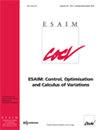Qualitative analysis of solutions to mixed-order positive linear coupled systems with bounded or unbounded delays
IF 1.2
3区 数学
Q4 AUTOMATION & CONTROL SYSTEMS
Esaim-Control Optimisation and Calculus of Variations
Pub Date : 2022-08-23
DOI:10.1051/cocv/2023057
引用次数: 0
Abstract
This paper addresses the qualitative theory of mixed-order delay positive linear coupled systems. First, we introduce a general result on the existence and uniqueness of solutions to mixed-order delay linear systems. Next, we obtain necessary and sufficient criteria which characterize the positivity of mixed-order delay linear coupled systems. Our main contributions are in Section 5. More precisely, by using a smoothness property of solutions to fractional differential equations and developing a new appropriated comparison principle for solutions to mixed-order delay positive systems, we prove the attractivity of mixed-order non-homogeneous linear positive coupled systems under the impact of bounded or unbounded delays. We also establish a necessary and sufficient condition to ensure the stability of homogeneous systems. As a consequence of these results, we show the smallest asymptotic bound of solutions to mixed-order delay non-homogeneous linear positive coupled systems where disturbances are continuous and bounded. Finally, we provide numerical simulations to illustrate the proposed theoretical results.具有有界或无界时滞的混合阶正线性耦合系统解的定性分析
本文研究了混合阶时滞正线性耦合系统的定性理论。首先,我们给出了混合阶延迟线性系统解的存在唯一性的一般结果。其次,我们得到了表征混合阶延迟线性耦合系统正性的充分必要判据。我们的主要贡献在第5部分。更准确地说,我们利用分数阶微分方程解的光滑性,建立了一种新的适合于混合阶时滞正系统解的比较原理,证明了混合阶非齐次线性正耦合系统在有界或无界时滞作用下的吸引性。建立了齐次系统稳定性的充分必要条件。作为这些结果的结果,我们给出了扰动连续有界的混合阶延迟非齐次线性正耦合系统解的最小渐近界。最后,我们提供了数值模拟来说明所提出的理论结果。
本文章由计算机程序翻译,如有差异,请以英文原文为准。
求助全文
约1分钟内获得全文
求助全文
来源期刊

Esaim-Control Optimisation and Calculus of Variations
Mathematics-Computational Mathematics
自引率
7.10%
发文量
77
期刊介绍:
ESAIM: COCV strives to publish rapidly and efficiently papers and surveys in the areas of Control, Optimisation and Calculus of Variations.
Articles may be theoretical, computational, or both, and they will cover contemporary subjects with impact in forefront technology, biosciences, materials science, computer vision, continuum physics, decision sciences and other allied disciplines.
Targeted topics include:
in control: modeling, controllability, optimal control, stabilization, control design, hybrid control, robustness analysis, numerical and computational methods for control, stochastic or deterministic, continuous or discrete control systems, finite-dimensional or infinite-dimensional control systems, geometric control, quantum control, game theory;
in optimisation: mathematical programming, large scale systems, stochastic optimisation, combinatorial optimisation, shape optimisation, convex or nonsmooth optimisation, inverse problems, interior point methods, duality methods, numerical methods, convergence and complexity, global optimisation, optimisation and dynamical systems, optimal transport, machine learning, image or signal analysis;
in calculus of variations: variational methods for differential equations and Hamiltonian systems, variational inequalities; semicontinuity and convergence, existence and regularity of minimizers and critical points of functionals, relaxation; geometric problems and the use and development of geometric measure theory tools; problems involving randomness; viscosity solutions; numerical methods; homogenization, multiscale and singular perturbation problems.
 求助内容:
求助内容: 应助结果提醒方式:
应助结果提醒方式:


